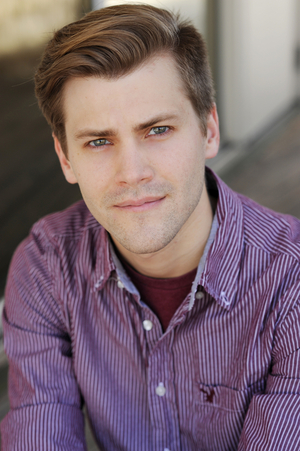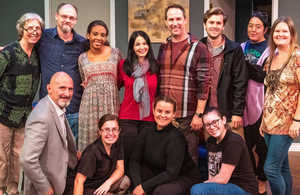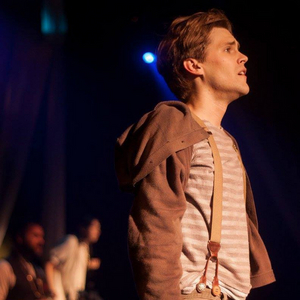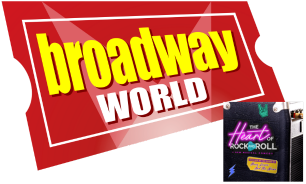Interview: Theatre Shutdown Interview With Alex Munro

In this time of uncertainty, the best one can do---and hopefully you've been doing so!---is to stay indoors and quarantine. While it's no news that many businesses and industries have been affected by the virus, an industry that has largely been impacted is certainly the arts. With cinemas and theatres temporarily closed, communities are unfortunately unable to attend the venues they frequent in order to be immersed in stories that help them escape reality for two hours. So, through the inability to review shows, I reached out to a friend of mind and collaborator, Alex Munro, whom I worked with on in #MeToo Monologues: Stories for Healing (2019) and the halted Where Words Once Were (2020), to not only do a spotlight but to also get some thoughts on what folks can do in order to help specifically theatres sustain themselves throughout these alarming, volatile times.
Munro, born into a military family, spent six of his formative years at a naval base in Iceland. He pursued his post-graduate endeavors at Roanoke College in Salem, VA. He also has his Master of Fine Arts from the University of Hawaii at Manoa, where he's currently finishing up his PhD dissertation, inspired by his work with HealthCAST, a collaboration he helped to develop between the Department of Theatre & Dance and the School of Nursing and Dental Hygiene's simulation center, in which, for the past seven years, he has trained theatre students to perform as simulated patients in dozens of scenarios with healthcare learners. In addition, he serves as an adjunct instructor at Hawaii Pacific University, where he teaches Acting II, Directing, and Theatre Performance, all while directing their mainstage shows. Having been on stage as an actor as well as a director, he prefers directing, because he "enjoys collaboration and directing allows me to collaborate with everyone involved in producing a show." Married five years to wife Kylee, they have a dog (Sutton) and a cat (Petra). Read on to see the social-distanced, virtual interview below about the three-time Po`okela-winning (2017 - Director of a Play - The Elephant Man with Paul T. Mitri; 2016 - Director of a Play - Equus; 2014 - Director of a Play - very still & hard to see) artist.
Q: What shows have you directed?
A: "Highlights include very still & hard to see by Steve Yockey, Equus by Peter Shaffer, The Legend of Georgia McBride by Matthew Lopez, Time Stands Still by Donald Margulies, #MeToo Monologues: Stories for Healing, and Eurydice by Sarah Ruhl. Also looking forward to finishing our production of Where Words Once Were by Finegan Kruckemeyer in the fall [delayed due to the virus]".
Q: How did you get into directing?
A: "I really got into theatre during college. I auditioned for a college production of The Laramie Project and didn't get in, but one of the actors who did encouraged me to take some classes and keep at it. I quickly fell in love with theatre and added it as a minor. I eventually took a directing class and really enjoyed it, which led to a fully produced one-act [play] in my senior year. I was also able to assistant direct for a storefront theatre in Roanoke, VA and meet professional directors from Chicago and New York. It wasn't long before I was seeking out graduate schools to deepen my understanding of directing, which led me to UH Manoa."
Q: Who has been some of your mentors throughout your professional theatre endeavors?
A: "Dr. Lisa Warren, Associate Professor of Theatre at Roanoke College, took me under her wing and helped instill a love of theatre and directing. Paul Mitri, Professor of Theatre at University of Hawaii at Manoa, was the chair of my MFA committee and we have continued to collaborate on projects at Manoa Valley Theatre (The Elephant Man) and through his theatre company, All the World's a Stage (Proof, Eurydice). Dr. Markus Wessendorf, Professor of Theatre at University of Hawaii at Manoa, is the chair of my PhD committee. He supports the academic/theoretical side of my theatre interests. I love that he challenges me and pushes me to grow as an academic and as an artist."
Q: Who are some of your theatre-world inspirations (local, national, or celebrities)?
A: "I don't really have one or two people I turn to specifically for inspiration. I try to find inspiration whenever I attend productions, watch interviews, read books, or engage in conversations with my peers. But, to have a little bit of fun here, my dog is named Sutton because my wife and I were listening to Little Women when we got her. Her official AKC name, by the way, is Sutton Foxter because she's a shiba inu and looks like a fox..."
Q: When directing, what compels you to select certain shows to direct?
A: "I'm very motivated by the question, 'Why this play now?' I used to hate it whenever my mentors asked me that question because I'd think, Well, I like the play and I want to direct it. What more is there? However, I later learned that the question forces me to consider everyone who would work on the show or buy a ticket to see it. It basically asks, Why should an audience in Honolulu in 2020 spend their hard-earned money and precious time to see this show? Or, Why should actors, designers, and everyone else involved with a production commit weeks or months of their life to work on this project. What's in it for them? Sometimes, the answer is, 'The world is difficult, and I want to give people a 2 ½ hour break from it all,' which provides the production with its own set of goals. Yet, I usually try to find something a little deeper, a question or thought that I want the production team, actors, and audience to explore with me through the production itself."
Q: What is the most important part of a story that you hope-as a director-to always evince to an audience?
A: "That really depends on the play itself. If it's a comedy, I want them to laugh. If it's a tragedy, I wanted to be moved. Sometimes there's an emotional scene and I hope the audience is affected by it. And/or there's a major theme or question that I want the audience to be talking about when the lights come up." 
Q: When auditioning actors, what do you look for in an actor for a role?
A: "A playful spirit, a willingness to collaborate, to try something new and to push past their first and second and third drafts of a character. I'm immediately turned off by cockiness."
Q: What is your perspective of the local theatre scene, meaning in what areas does it thrive, and in what areas do you hope to see improvement/more awareness or developments in?
A: "I love the local theatre scene. Everyone has each other's back. We're always borrowing and renting props, costumes, lights, and set pieces. We're not territorial or selfish. For example, I've assembled a set for one theatre company in the house of another theatre company. I've also had rehearsals for a university show in the house of a local theater company.
"There's also something for everyone: Diamond Head is great for those looking for big 'Broadway-style' shows and lighter fare; Manoa Valley Theater always keeps its audiences on its toes (not every theatre would program Spring Awakening before Honk!); Kumu Kahua is vitally important for showcasing local stories and talent; The Actor's Group, Kailua Onstage Arts, and All The World's A Stage brings newer (and often edgier) plays that can challenge its artists and audiences. Of course, I'm failing to mention all of the schools and universities that produce shows as well as the other theater companies that pop-up with shows a few times a year to support important missions, such as better representing queer stories and works by people of color. Artists and audiences alike have countless opportunities to cultivate their craft and/or receive a wide array of stories.
"However, we need a stronger commitment towards challenging the status quo. We don't have a lot of trained critics attending and critiquing our shows. And, whenever a negative comment is posted on local blogs or formal reviews, the critic is attacked mercilessly. We need to embrace constructive criticism and recognize that it will make us better artists because it pushes us to deepen and strengthen our storytelling.
Q: What is a stigma or stereotype about anything in theatre-actors, auditions, certain plays, the hats people wear, etc.-that you'd like to clear up?
A: "Theatre is fun, but it's not easy! Too often, I encounter folks who think that memorizing lines is the most arduous task in theatre. I'm always stressing to non-theatre folks that theatre is a massive commitment of time, energy, blood, sweat, tears, and talent."
 Q: With the ongoing status of the virus and thus the temporary absence of the arts, what do you hope theatre patrons-and even people in the community that don't necessarily frequent the theatre-will realize about the arts, whether on a local and/or national scale?
Q: With the ongoing status of the virus and thus the temporary absence of the arts, what do you hope theatre patrons-and even people in the community that don't necessarily frequent the theatre-will realize about the arts, whether on a local and/or national scale?
A: "There are a lot of memes floating around social media that highlights how we are all turning to the arts to make it through the pandemic. Artists are at the core of Netflix, Hulu, and Amazon Prime, as well as the national, regional, and community theatres making their catalogs available. Let's hope that we find a better appreciation for artists and other essential folks (grocery store clerks, custodial crews, etc.) on the other side of this pandemic."
Q: What are some of your long-term professional goals?
A: "I love teaching and I hope to be a full-time professor at a liberal arts school. Ideally somewhere near mountains and an airport."
...As you can see, Munro is a stalwart supporter and advocate of the arts. From his interest in acting to his passion for directing as well as his outreach to incorporate other forms of industry into the arts, he is certainly someone who not only thrives through the mode of storytelling but also his desire to ensure that people have an emotional take-away from whatever story they are watching. Thank you, Alex, for your contributions and visions to Hawaii theatre!
Join Team BroadwayWorld
Are you an avid theatergoer? We're looking for people like you to share your thoughts and insights with our readers. Team BroadwayWorld members get access to shows to review, conduct interviews with artists, and the opportunity to meet and network with fellow theatre lovers and arts workers.
Interested? Learn more here.
Videos
